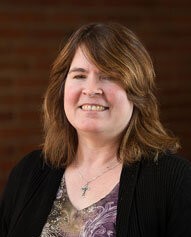
Mary Hirschfeld
Citation
Written by Fr. Michael Sweeney, OP, on May 2013 at the Induction in the College of Fellows
Mary Hirschfeld, economist, theologian, educator, loyal daughter of the Church, the Dominican School of Philosophy and Theology salutes you.
In his widely circulated remarks to the diplomatic corps accredited to the Holy See, Pope Francis commented the global economic crisis:
Certain pathologies are increasing, with their psychological consequences; fear and desperation grip the hearts of many people, even in the so-called rich countries; the joy of life is diminishing; indecency and violence are on the rise; poverty is becoming more and more evident. People have to struggle to live and, frequently, to live in an undignified way. One cause of this situation, in my opinion, is in our relationship with money, and our acceptance of its power over ourselves and our society. Consequently the financial crisis which we are experiencing makes us forget that its ultimate origin is to be found in a profound human crisis. In the denial of the primacy of human beings! We have created new idols. The worship of the golden calf of old (cf. Ex 32:15-34) has found a new and heartless image in the cult of money and the dictatorship of an economy which is faceless and lacking any truly humane goal.
The Holy Father’s comments are, without question, well founded. Yet they will be too easily dismissed as impractical or even as naïve by many economists. There appears to be an intractable problem whenever the Church comments economic relationships: in the minds of many, and especially of those who shape economic policy, any moral position that is taken must itself have an economic justification; the dictatorship of the economy appears to be absolute.
It is this problem and challenge that you have determined to address. You have impeccable credentials for this task. Having graduated Summa Cum Laude in Economics from Washington State University, you studied at Harvard, receiving the MA and PhD with a focus on economic history and macroeconomics.
Having taught economics at Occidental College for fifteen years, and following upon a conversion to the Catholic faith, you determined on a course that would daunt the most courageous hearts: resigning your tenured position, you pursued the doctorate in theology at Notre Dame. Your dissertation, Virtuous Consumption in a Dynamic Economy: a Thomistic Engagement with Neoclassical Economics, is demonstration of the fact that you have a distinctive, and highly unusual possibility for advancing conversations concerning economics and Catholic social teaching: you are a theologian who can speak with authority as an economist to other economists, and you are an economist who can speak with authority as a theologian to other theologians.
Already your voice is being heard. In 2011 you accepted an appointment as Assistant Professor of Economics and Theology at Villanova University. You have offered papers at such institutions as Notre Dame, USC, Fondazione Centesimus Annus pro Pontifice, in Milan, Italy, the Pontifical Council for Peace and Justice in Rome, and Cambridge University in England.
You have chosen the work of St. Thomas Aquinas as a starting point for engaging contemporary economic theory. Your choice of St. Thomas is grounded in his insistence upon an incarnational, and hence practical, approach to human agency: St. Thomas, you have pointed out, does not villainize self-interest; he appreciates the fact of the finitude of human endeavors and conceives of property and prosperity as real, though subordinate, human goods; he is able to speak of human enterprise in the light of the final end of the human person, while acknowledging the reality and proper dignity of secondary causes. And, as you wonderfully pointed out at the Margaret Beaufort lecture at Cambridge University, justifying your choice of St. Thomas in terms that even the least theologically sophisticated of your listeners could grasp without difficulty, “He’s just real smart!”
We judge your work to be of profound importance to the Church and society, and we are honored that you have responded to our invitation to join with us in bridging the Catholic tradition and the contemporary academy and culture in our College of Fellows.
Therefore, as an expression of our esteem and gratitude, and in virtue of the authority invested in me by the Board of Members of the Dominican School of Philosophy and Theology, I am privileged to bestow upon you, Mary Hirschfeld, the degree of Doctor of Humane Letters honoris causa, and to name you a Fellow of the Dominican School of Philosophy and Theology.
